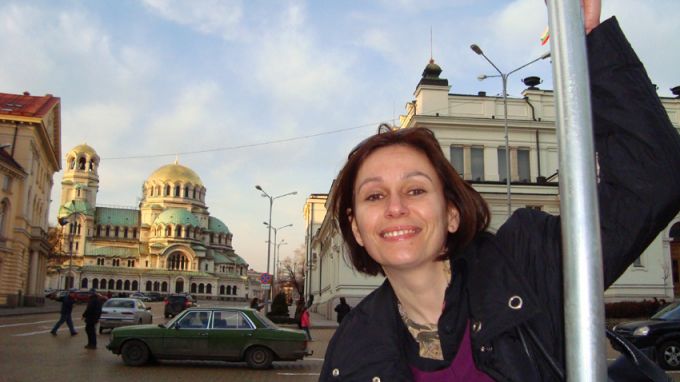 9
9
Is it possible to get an idea of the most emblematic landmarks in Sofia in just 120 minutes? Well, anything is possible as long as you show up in the right place at the right time.
The place is the Palace of Justice in the centre of Sofia, the time – 11 AM or 6 PM. In summer or in winter, rain or shine, there is always a motley crowd of foreign tourists in front of the central courthouse building, buzzing away in different languages. A little muddle-headed, city map or guidebook in hand, the tourists set out on their FreeSofiaTour – a walking tour of Sofia that is free of charge, organized by a group of young volunteers who have dedicated their time to a noble cause, that of helping tourists from abroad get to know and love their city.
It is like going into a time warp – that is how the foreigners describe their tour of Sofia and its historical landmarks. Walking through the streets jammed with cars and the crowded pavements, they marvel at the remains of old Roman baths, well-preserved medieval churches and magnificent Secession buildings from the turn of the 20th century reflected in the glazed facades of brand new banks, hotels and malls. The eclectics of different ages and architectural styles makes for the city’s atmosphere, most visitors say. And one way to dive into this atmosphere are the FreeSofiaTours. Tens of thousands of tourists from 107 countries have so far done just that. Information about the tour is passed on by word of mouth, via the Internet or at Sofia hotel desks.
The idea of the organizers is to show more than just the history or the buildings of the city. Guides “initiate” tourists into the city, giving them a chance to choose what they want to see, or if their visit is only a brief one, to come back again. Sometimes the group consists of two-three people, but usually thirty, even fifty people gather in front of the Palace of Justice! Frequently the group is joined by day travelers who say they don’t usually go in for such tours but that they really enjoyed this particular one. The Sofia tour is also joined by businessmen, backpackers, participants in international conferences etc.
The motley groups touring Sofia twice a day have become part of the urban landscape. And the icing on the cake – the tour usually winds up in front of the Alexander Nevski cathedral. Before that the tourists visit the Roman ruins next to Sheraton hotel, see the changing of the guard in front of the Presidency, the former royal palace, now an art gallery, the garden in front of the National Theatre with its beautiful fountains and the chess players out front. Some even stop a while to play a game of chess with them. Tourists from abroad invariably marvel at the mineral water gushing in the heart of a city with a population of two million! They rush to the water fountains and simply cannot believe the city centre has such an abundance to offer.
And it seems everything we, Bulgarians consider negative is to them exotic. They frequently ask the guides why there are so many potholes and about other things we are accustomed to, but what they say they like is that Sofia is such a quiet town with no throngs of tourists. The superposition of different historical layers is another thing they find very interesting. At the same time Sofia does not have a differentiated historical centre as other cities do, but in all parts of the city, history exists side by side with modernity. Visitors are also thrilled by the unique combination of mountain and mineral water. But what they admire most are Sofia’s parks, the FreeSofiaTour volunteers say. In the eyes of the guests from abroad Sofia is a city that is lush green (something most of us would definitely disagree with). What is more, many of them say it is one of the greenest and cleanest cities they have ever been to!
English version: Milena Daynova
Photographs: courtesy of Veneta Nikolova
As in 2024, this season's vacancies in the tourism industry will be filled by workers from third countries . According to employers from the Northern Black Seacoast, entire Turkish teams are employed in the kitchens of Albena resort. Workers from..
The first tourists of the new tourist season arrive today on a flight from the Polish city of Krakow. At Burgas Airport, they will be welcomed with a water salute and souvenir gifts in the presence of the Minister of Tourism Miroslav Borsos and the..
Intense preparations are underway on the Southern Black Sea coast for the upcoming summer season. The first tourists are expected for Easter, and businesses are actively seeking thousands of workers, reports public service broadcaster BNT. The..

+359 2 9336 661
